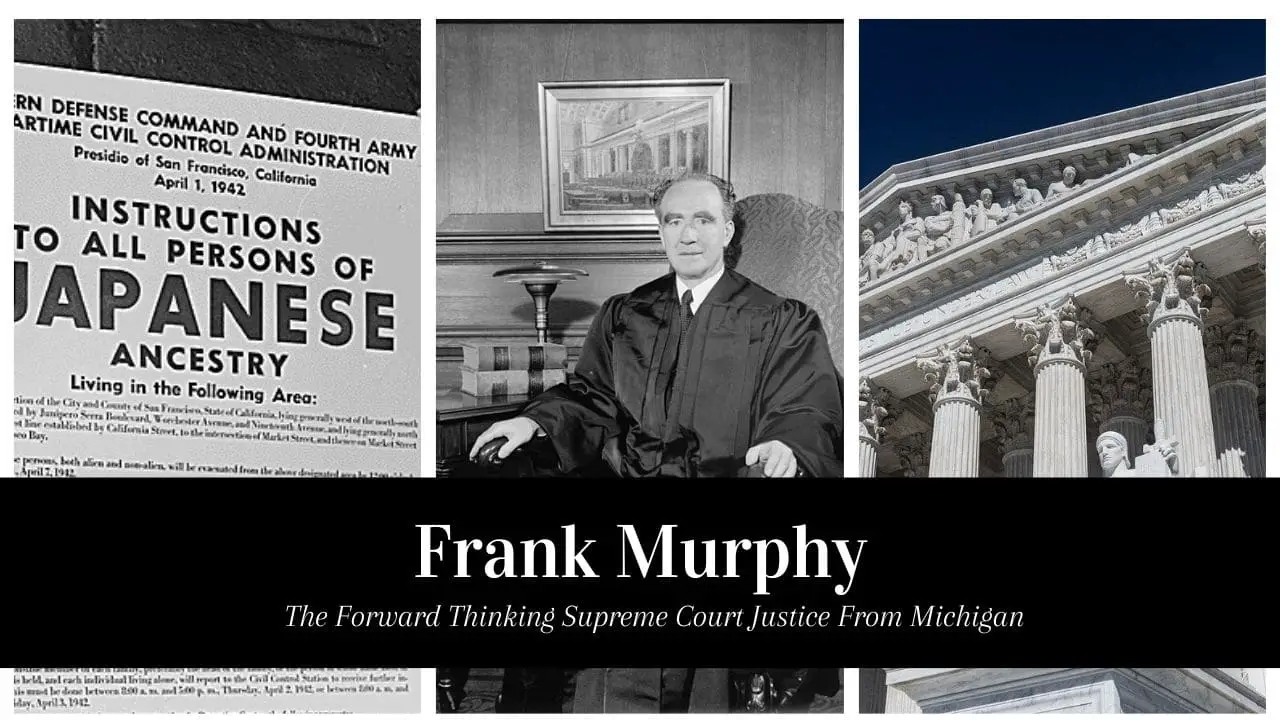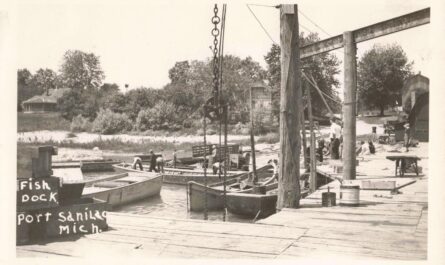Frank Murphy, the thirty-fifth governor of Michigan, was born in Harbor Beach, Michigan, on April 13, 1890. His education was attained at the University of Michigan, where he earned his undergraduate degree in 1912 and his law degree in 1914. He later attended graduate classes at Trinity College in Dublin and at Lincoln’s Inn in London.
Table of Contents
Supreme Court Judge from Michigan’s Thumb

What was Harbor Beach, Michigan like in 1890?
In 1890, Harbor Beach, Michigan, was a bustling, vibrant community centered around its thriving lumber and shipping industries. The harbor, considered the world’s largest man-made freshwater harbor, was a hub of activity, servicing steamships laden with goods. The town boasted a diverse population thanks to a surge of immigration, particularly from Germany. Residents enjoyed a range of amenities, including a schoolhouse, churches, and various shops. The city’s growth was boosted by the arrival of the Port Huron and Northwestern Railway in 1882 (Source: “A Brief History of Harbor Beach”, Harbor Beach Chamber of Commerce).
Frank Murphy Had A Career of Service
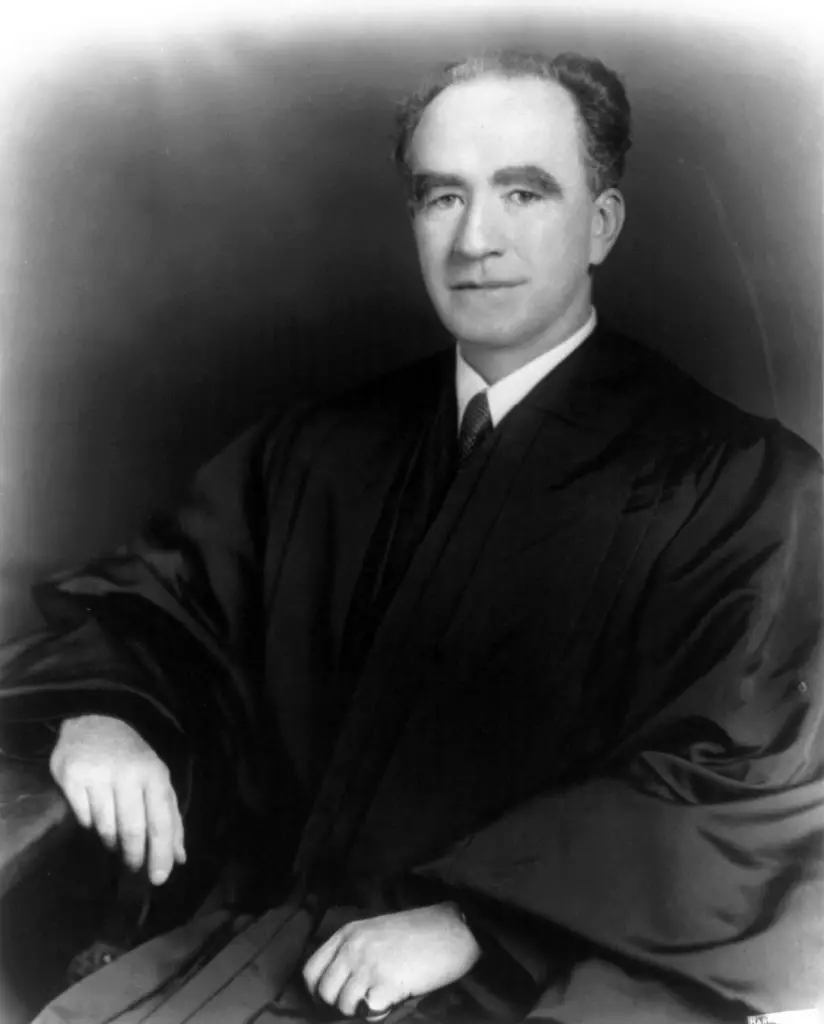
Frank Murphy saw action in both World Wars, serving as a first lieutenant and later rising to the rank of lieutenant colonel. After his military service, he secured an appointment as first assistant U.S. attorney for the Eastern District of Michigan, a position he held from 1919 to 1920. He also served as judge of the Recorder’s Court from 1923 to 1930, was mayor of Detroit from 1930 to 1933, served as governor-general of the Philippine Islands from 1933 to 1934, and was the U.S. First High Commissioner to the Philippines from 1935 to 1936.
Frank Murphy – Politician
Murphy next secured the Democratic gubernatorial nomination and was elected governor by a popular vote on November 3, 1936. During his tenure, an unemployment compensation system was instituted; a sit-down strike in Flint and an industrial plant strike were both dealt with, and mental health programs were improved. After running unsuccessfully for reelection, Murphy left office on January 1, 1939.
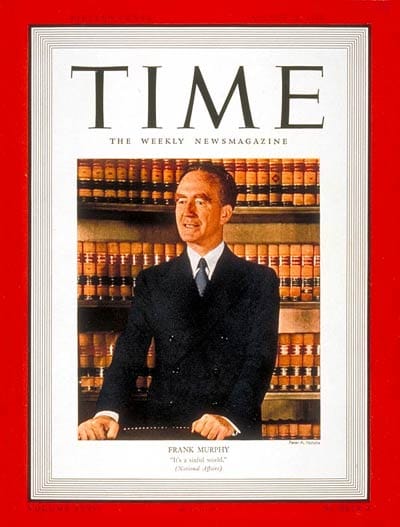
Frank Murphy remained politically active, serving as the U.S. attorney general from 1939 to 1940. In 1940, Franklin Delano Roosevelt nominated him as an associate justice of the U.S. Supreme Court. He held this position until his death in 1949.
Korematsu v. the United States – Murphy’s Dissent Opinion
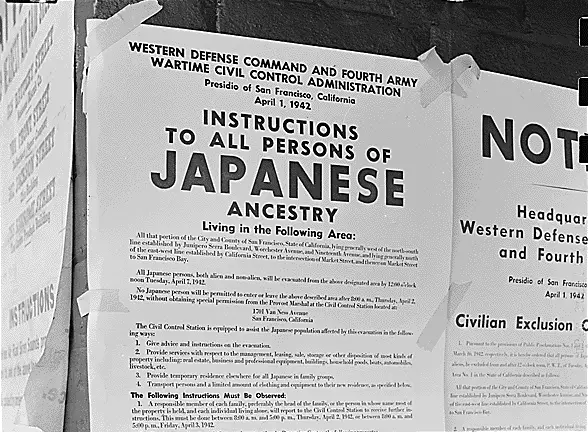
Murphy was the only dissent opinion of the Supreme Court decision Korematsu v. the United States in 1944. This was a significant court case concerning the constitutionality which ordered Japanese Americans into internment camps during World War II. His dissent was considered groundbreaking as he used the term, “falls into the ugly abyss of racism.” It was the first time the word “racism” found its way into a Supreme Court opinion.
“I dissent, therefore, from this legalization of racism. Racial discrimination in any form and in any degree has no justifiable part whatever in our democratic way of life. It is unattractive in any setting, but it is utterly revolting among a free people who have embraced the principles set forth in the Constitution of the United States. All residents of this nation are kin in some way by blood or culture to a foreign land. Yet they are primarily and necessarily a part of the new and distinct civilization of the United States. They must, accordingly, be treated at all times as the heirs of the American experiment, and as entitled to all the rights and freedoms guaranteed by the Constitution.”
Dissent Opinion of Frank Murphy, Korematsu v. United States, 1944
After 1944 and the Korematsu v United States case, the word “racism” would not reappear in a Supreme Court decision for another 18 years until the Brown v. Louisiana case in 1966.
Frank Murphy’s Impactful Opinions on the First Amendment
Justice Murphy was known for his strong advocacy for First Amendment freedoms, especially in cases involving individual and religious liberties. He consistently championed these rights, emphasizing their importance to democracy and personal liberty.
The Concept of ‘Fighting Words’:
Despite his broad protection of First Amendment rights, Murphy also recognized limits to free speech. In Chaplinsky v. New Hampshire (1942), he articulated the idea that specific categories of speech, such as ‘fighting words,’ are not protected by the First Amendment. He defined ‘fighting words’ as those which “by their very utterance inflict injury or tend to incite an immediate breach of the peace.” This established a crucial precedent: while the First Amendment provides robust protections, it does not shield speech that directly incites violence or constitutes direct personal insults that could provoke immediate confrontation.
This distinction has profoundly impacted American jurisprudence, establishing a balance between protecting free expression and maintaining public order. Murphy’s efforts demonstrate his commitment to the First Amendment while also acknowledging the practical need to limit certain types of speech that could lead to immediate harm or violence??.
Frank Murphys Death
Governor Frank Murphy passed away at Henry Ford Hospital on July 19, 1949, at age 59. His funeral was attended by over 10,000 people. He is interred at Our Lady of Lake Huron Cemetery in Harbor Beach, Michigan.
Frequently Asked Questions (FAQs) about Justice Frank Murphy:
In the history of the United States Supreme Court, how many justices were from Michigan?
In the history of the United States Supreme Court, there have been two justices with significant ties to Michigan:
Frank Murphy: He was born in Harbor Beach, Michigan, and served in several notable roles within the state, including as the Mayor of Detroit and the Governor of Michigan, before his appointment to the Supreme Court.
Henry Billings Brown: Although born in Massachusetts, Henry Billings Brown made his career and life in Detroit, Michigan. He was a significant figure in the legal community there before being appointed to the Supreme Court.
What were the notable early career positions held by Justice Frank Murphy before his appointment to the U.S. Supreme Court?
Frank Murphy held several significant positions before his appointment to the U.S. Supreme Court. After serving in World War I, Murphy began his legal career as an Assistant U.S. Attorney for the Eastern District of Michigan. He then transitioned to local government, serving on Detroit’s Recorder’s Court. His political career advanced as he became the Mayor of Detroit and then the Governor-General of the Philippine Islands. Following this, he returned to the United States to become the Governor of Michigan. His final role before joining the Supreme Court was as U.S. Attorney General under President Franklin D. Roosevelt. Throughout his career, Murphy was known for his commitment to social justice and civil rights.?
How did Justice Frank Murphy impact First Amendment jurisprudence during his tenure on the U.S. Supreme Court?
Justice Frank Murphy is remembered for his robust defense of First Amendment rights, particularly regarding free speech and religious freedom. One of his most notable contributions to First Amendment jurisprudence was his participation in the case of Chaplinsky v. New Hampshire (1942), where he articulated the concept of “fighting words” — speech that by its very utterance inflicts injury or tends to incite an immediate breach of peace is not protected under the First Amendment. This doctrine recognized that while the freedom of speech is fundamental, there are limitations when speech poses a clear and immediate danger to others. Murphy’s opinions often reflected his deep belief in protecting individual liberties and fostering a society respectful of diverse opinions and beliefs?. “Frank Murphy.” Oyez, www.oyez.org/justices/frank_murphy. Accessed 13 Mar. 2024.
Related Stories
As the world’s largest freshwater man-made harbor, the port of Harbor Beach, Michigan, is an ideal stopping point for sailors making their way up the shore of Lake Huron. With its protected port and town steps away from the Marina, Harbor Beach offers sailors and boaters a welcome break and an ideal provisioning point. If you find yourself with a few extra hours, there are some great little sightseeing trips that are close and interesting. Harbor Beach Port
Albert E. Sleeper was governor of the state of Michigan during 1917-1921. At a convention of United States governors, held during World War I, Sleeper was saluted as the greatest war-time governor in the United States. Albert E Sleeper – Governor for 20th Century Michigan
The Upper Thumb is the home to a very diverse blend of radio stations. While the region surrounded stations from Bay City, Tawas and Detroit the area held its own with great local programming. Here is a detailed listing of Michigan’s Upper Thumb Radio stations located in Huron, Sanilac and Tuscola County. Upper Thumb Radio Stations
Over the past twenty years, the Great Lakes region has been steadily increasing the number of new wind projects and wind energy output. Now that pace looks to have slowed with more local communities placing acting tighter zoning control over industrial wind development. However, growth continues as the cost of new projects declines. Michigan Competitive in Wind Production, But Future Limited

